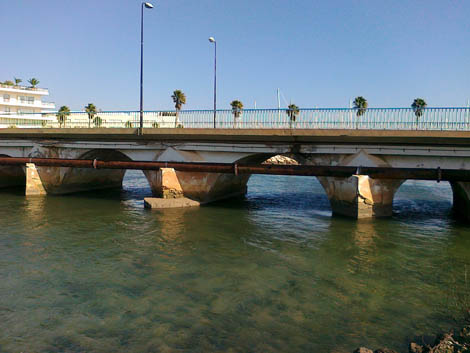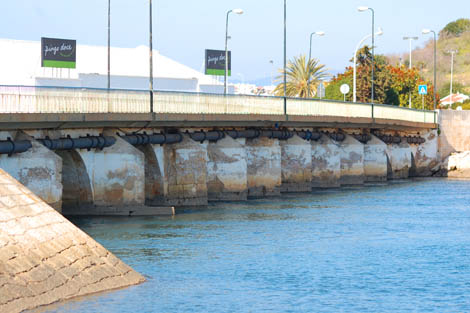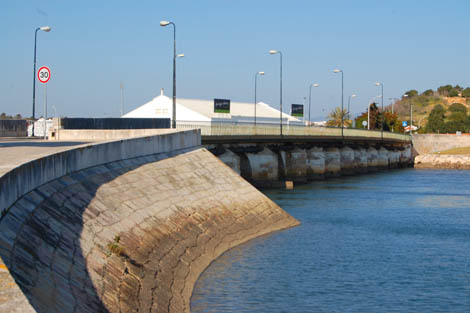 The Lagos CDU defends, in an open letter released yesterday, the construction of a new bridge between the two banks of the Ribeira de Bensafrim, in that city, and the return of the D. Maria II bridge to its pre-1950 design, but the plans of the City Council, already in progress, are others.
The Lagos CDU defends, in an open letter released yesterday, the construction of a new bridge between the two banks of the Ribeira de Bensafrim, in that city, and the return of the D. Maria II bridge to its pre-1950 design, but the plans of the City Council, already in progress, are others.
The D.Maria II bridge, which was part of the EN125 and guaranteed access to Lagos, was closed to traffic on February 11, 2012, by order of the Chamber, after an inspection of the National Laboratory of Civil Engineering (LNEC) have detected problems in the structure.
In their open letter, the communists defend the «recovery of the valuable heritage originality of the bridge from before 1950» and advocate the construction of «a new bridge on the west side of Pingo Doce, diverting the existing street, to connect it to the existing street. on the right bank, up to the junction of the roundabout of the boat'.
With this solution, for which funding CDU leaves no clues in its open letter, “the road link with Meia Praia will, in practice, be identical to the one that has been interrupted. Direct access from the left bank to the Sports Complex will also be provided”, as well as “all the interests involved, public and private, urban, cultural, commercial, being satisfied”.
The old bridge, according to the communists, should be "exclusively for pedestrian traffic, therefore without the cost of technical requirements to admit heavy loads".
However, the plans of the municipality of Lagos are different, as he revealed to the Sul Informação the new president of the Chamber Joaquina Matos. «The project for the rehabilitation of the D. Maria II bridge has already been awarded [still by the previous executive]», and «on November 5th, the first meeting with the design team will take place». The mayor herself, as well as municipal technicians, will participate in this first meeting.
 What the Câmara de Lagos foresees, in a process initiated by the former executive led by Júlio Barroso and now continued by Joaquina Matos, both from the PS, is «the total rehabilitation of the bridge, whose structure will be fully reinforced, strengthened, in order to withstand everything the type of traffic. It will be like a new bridge».
What the Câmara de Lagos foresees, in a process initiated by the former executive led by Júlio Barroso and now continued by Joaquina Matos, both from the PS, is «the total rehabilitation of the bridge, whose structure will be fully reinforced, strengthened, in order to withstand everything the type of traffic. It will be like a new bridge».
As for the aesthetic aspect, the mayor guarantees that it will "maintain and even recover the old design".
According to Joaquina Matos, the rehabilitation project for the Ponte D. Maria II also provides for “an expanded pedestrian area, but maintaining the road connection between the two sides of the stream, between the avenue and the other side. Great attention is being paid to pedestrian circulation. The bridge will retain its design, but it will be a completely renovated structure».
Although the project is still being prepared, the first estimates for the work indicate costs in the order of one million euros. And who pays for this investment? “The Council will pay a part, but we will also see what European financing we can still resort to”, reveals Joaquina Matos.
As for the CDU's proposal to recover the old bridge, only for pedestrian traffic, and the construction of a new structure next door, the socialist mayor says that "this is not being considered", even because "it would represent a great burden for the municipality ».
 Despite this opinion of the Municipality of Lagos, the Lacobrigenses communists, in their open letter, state that it will be negative to insist “on keeping all the errors that, in the work of the 50s of the 2008th century, and unbelievably repeated in the Lagos Urbanization Plan of XNUMX , focused on the historical and memory heritage that is the bridge of D.Maria II, in the authenticity of its ancient form».
Despite this opinion of the Municipality of Lagos, the Lacobrigenses communists, in their open letter, state that it will be negative to insist “on keeping all the errors that, in the work of the 50s of the 2008th century, and unbelievably repeated in the Lagos Urbanization Plan of XNUMX , focused on the historical and memory heritage that is the bridge of D.Maria II, in the authenticity of its ancient form».
On the other hand, they argue that «the new bridge, of today, will be an invaluable contribution, both as an expression of the technique and culture of our time, and in the harmonious structuring of the future of Lagos» and advocate a «broad public debate» on the possible solutions, "covering the population, the technical knowledge, the cultural values and the interests covered".

















Comments